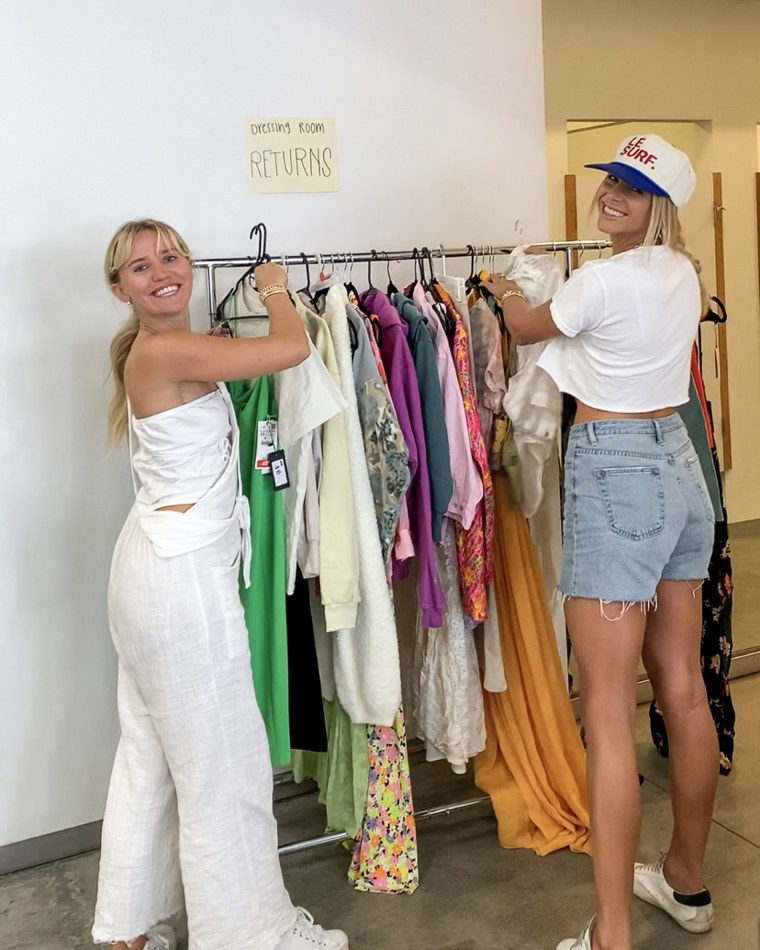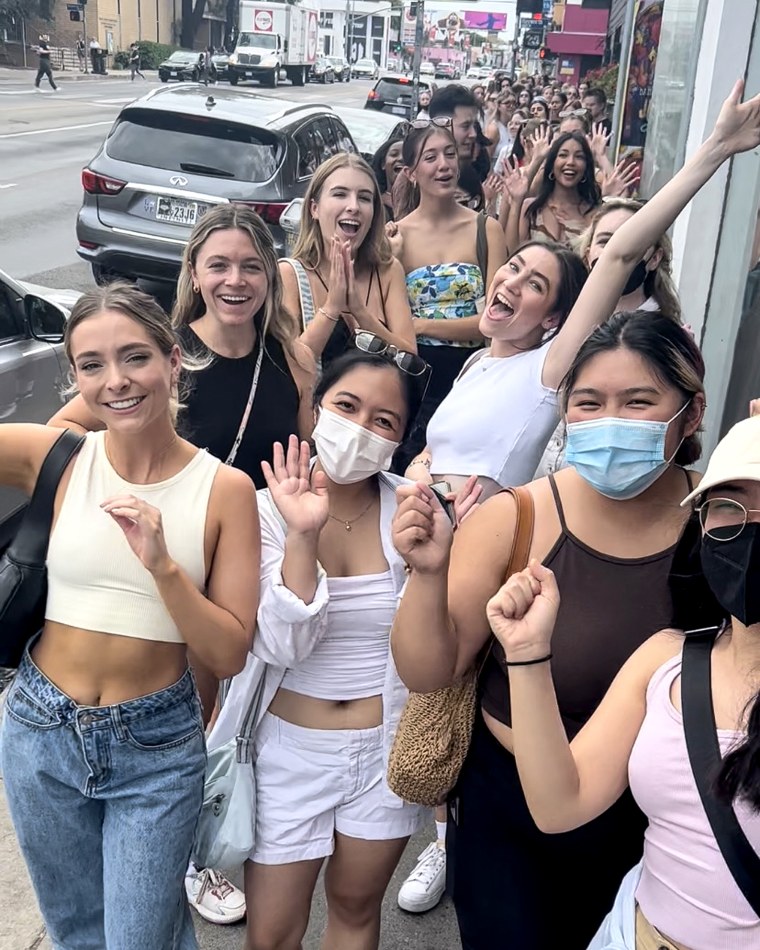An ‘influencer thrift store’ wants to tackle fast fashion waste
[ad_1]
An influencer may wear an outfit in just one post before banishing it to the depths of the closet. It may stay there, unworn and unused, until it’s time for the occasional wardrobe cleanout. At best, the garment will be resold or donated. At worst, it’ll end up in a landfill.
Detoure, an online consignment shop, wants to change that.
The company, which describes itself as an “influencer thrift store,” is trying to lessen the burden on overflowing landfills by tackling influencers’ overflowing closets.
Accelerating trend cycles are only adding to the fast fashion industry’s nearly insurmountable toll on the environment. Detoure sells influencers’ trendy clothing — most of which is either new with tags or has been worn only once — for a small fraction of the cost of buying the garments new.
“The way social media’s going, influencers wear the clothes once for a photo and then they never really wear it again,” said Detoure’s founder, Meghan Russell. “And so what happens to the clothes then at that point?”
In the year since Russell launched Detoure, the store has partnered with about 50 influencers, and Russell plans to expand the roster in the coming months. Primarily an online store, Detoure has gone viral on TikTok for its Los Angeles pop-up events, which it started hosting this year.
The way social media’s going, influencers wear the clothes once for a photo and then they never really wear it again. And so what happens to the clothes then at that point?
Meghan Russell, DETOURE FOUNDER
The line for Detoure’s July pop-up — which took place in a borrowed streetwear store — stretched down Melrose Avenue. Drawn in with promises of being able to buy affordable clothing without having to dig for it, as at a traditional thrift store, hundreds of hopeful shoppers flocked to the event Sunday.
For $5 to $10, customers could snag crop tops from fast fashion brands like Pretty Little Thing or Zara. A powder blue midi skirt from the brand ASTR the Label, which originally retailed for $98 last season, was priced at $30. Among Detoure’s most expensive pieces was a dainty lace dress with the original tags still intact from the brand For Love & Lemons. It’s a significant drop from buying the dress from retailers like Revolve or Dolls Kill, which priced the dress at $278.
“We’re all pressured to buy something that’s super trendy right now, but next month, it probably won’t be,” Russell said. “I think this allows consumers to buy what they want to right now but also feel good about their purchase, because it’s not contributing in any way to the waste.”
Doing the behind-the-scenes work
Russell, 24, became passionate about ethics in fashion in college, where she studied global health and the rampant human trafficking in the textile industry. After graduation, she worked with influencers for a marketing job in sustainable fashion. A conversation Russell had with an influencer, who was “ranting about how her closet’s overflowing,” inspired her.
“She didn’t have time to sell on Depop or Poshmark,” Russell said. “And she didn’t want to throw it away, because she didn’t want it to be in a landfill. A lightbulb moment went off then.”
Russell decided to finally pursue the idea after she was laid off weeks into the pandemic. She began messaging people to pitch her idea, and through word of mouth, she developed a cohort of fashion and lifestyle creators thrilled to clear out their closets.

Although many influencers and lifestyle creators resell their clothing on Depop and Poshmark, it’s a time-consuming and labor-intensive process. Detoure takes on most of the burden by collecting inventory, determining prices, posting listings and handling shipping. Detoure also took a smaller commission when it launched. Depop takes a 10% fee, and Poshmark takes a flat $2.95 for items under $15 and a 20% fee for items over $15.
Karsen Kimball, an influencer who posts try-on videos on TikTok, described partnering with Detoure as a “crazy blessing.”
“I’ve always struggled with trying to list things on Poshmark,” Kimball said. “It’s obviously super time-consuming, and it’s not a typical part of our jobs.”
Carolena Huseby, a creator who makes travel and lifestyle content, “started with Poshmark” but found that it was “taking away” from her working hours because it took so much time.
“You would get a PR package and it could not have a tag on it, and you wouldn’t know what to put [the price] as,” Huseby said. “So it was hard to do the behind-the-scenes work.”
A need for size inclusivity
The location of every Detoure event is “secret,” and to get the address, attendees have to register in advance. Detoure sends out text and email alerts with the addresses a few days before the pop-ups.
Russell estimates that 500 people attended the most recent pop-up. There, Huseby and Kimball assisted with restocking and crowd control.
At some earlier events, Detoure sold out of inventory in less than two hours. To ensure that everyone had a fair chance to shop — and to prevent overcrowding inside — the pop-up operated in shifts.
About 50 attendees were allowed in at a time, and they had a 15-minute window to peruse the racks. At the end of each window, Detoure employees herded shoppers to the checkout line, restocked the racks and allowed in 50 more attendees.

Those who were still waiting in line to check out during restocking were asked to abstain from buying any of the newly added clothing, so the next group could have a chance to buy it.
Whatever inventory was left over was donated to the Downtown Women’s Center, a Los Angeles organization that serves unhoused women.
While Detoure’s pop-up did include a wide size range, there was still a disparity between the sheer volume of straight-size clothing and the more limited selection of plus-size options.
Many of the shoppers flocked to the XS to L racks, which were picked through minutes into every shopping window. Detoure employees balancing baskets of garments restocked the racks with fresh waves of inventory every time sections looked bare. The plus-size rack was far from sparse, but it didn’t feature the abundance of designer pieces that the straight-size sections had.
Alina Murillo, who was visiting a friend in Los Angeles and had waited in line for an hour and half, said she was impressed by Detoure’s size range. But she said she didn’t think it was worth it to wait so long to shop such a limited selection of clothing.
“I’m a little bit on the curvier side, so I was reluctant that I wouldn’t really find anything that fits me, but I did.” Murillo said as she checked out. “For more petite girls … it’s where they had really cute stuff. I just can’t fit in it. [I’d] like a little more inclusivity with curvier ladies, but I was impressed by what they actually had.”
Russell acknowledged that traditionally, “influencers have been one type of body.” Detoure carries sizes XXS to 4XL, and Russell said the brand is “working to get a lot more influencers of different sizes” on the roster.
“I never want someone to not feel like we represent them,” she said. “As we grow and expand to more and more influencers, that’s something that we’re really going to keep in mind and that we’re really going to prioritize.”
Encouraging sustainable shopping
The fast fashion industry is wasteful and exploitive, but it’s growing faster than ever. Shein, a Chinese retailer known for selling cheap duplicates of trendy designer pieces, was valued at $100 billion this year. Micro trends popularized on TikTok are driving fast fashion sales; the rapid turnover of “must-have” wardrobe staples encourages consumers to keep buying new clothes.
Clothing brands marketed as “sustainable” or “ethically sourced,” meanwhile, are often prohibitively expensive. “Slow fashion” claims to use renewable resources and pay its workers fair wages, but the high cost of a single garment is a deterrent for the majority of consumers. A summer dress made of plant-based viscose fabric from the brand Reformation can cost $248. A polyester lookalike from Shein, however, costs $14.
The actual sustainability of “sustainable” fashion is dubious. The lack of transparency in fashion manufacturing, acco The Financial Times reports, allows brands to “say whatever they want.” Environmental watchdog groups have raised concerns over “greenwashing” in fashion — a marketing tactic companies use to make misleading claims about their commitment to sustainability without actually changing their practices to be more sustainable.
It’s unlikely that fast fashion will slow down in the near future, and banking on “sustainable” brands to lower their prices to compete with fast fashion brands is unrealistic.
The most sustainable way to shop, Russell said, is to buy secondhand clothing instead of contributing to waste.
“The main goal was to make it affordable for people,” she said. “Pushing sustainable fashion isn’t going to change anything if people can’t afford it.”
Shopping in a conventional thrift store can be like sifting for gold. Occasionally, a shopper may find a coveted designer item for the same cost as the Shein knockoff. “Thrift flipping” — the practice of tailoring an outdated thrifted garment to make it trendy and modern — is on the rise, but it requires technical skills and patience that few people have.
Russell hopes that by curating clothing that’s already in style, Detoure will encourage consumers to be more conscious of shopping sustainably.
“People get really excited to find the treasures out there,” she said. “We do the filtering for you.”
CORRECTION (Aug. 3, 2022, 4:56 p.m. ET): A previous version of this article misspelled the first name of Detoure’s founder. She is Meghan Russell, not Megan.
[ad_2]
Source link







